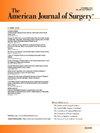先前的创伤性损伤独立预测了ICU手术败血症患者较高的90天死亡率。
IF 2.7
3区 医学
Q1 SURGERY
引用次数: 0
摘要
败血症和创伤是导致死亡的主要原因。我们假设先前的创伤会导致更糟糕的结果。方法:对2013年9月至2019年1月期间入住SICU的符合脓毒症III标准的患者进行单机构回顾性研究。纳入1401例患者,7.8% (n = 106)有外伤史。采用Cox回归对院内死亡和90天死亡率进行建模。根据创伤状态计算Kaplan-Meier 90天生存曲线。结果:先前创伤与住院死亡率相关(p = 0.03)。外伤、转院状态、年龄、Charlson合并症指数、入院乳酸和SOFA评分均为住院死亡率和90天死亡率的独立预测因子(p < 0.005)。90天生存曲线显示创伤组生存率有下降趋势(p = 0.02)。结论:我们的研究结果表明,先前的创伤可能对患者的预后有显著影响。有必要进一步研究创伤与败血症之间的潜在机制。本文章由计算机程序翻译,如有差异,请以英文原文为准。
Antecedent traumatic injuries independently predict higher 90-day mortality for patients admitted to the ICU with surgical sepsis
Introduction
Sepsis and trauma are leading causes of mortality. We hypothesize that antecedent trauma contributes to worse outcomes.
Methods
A single-institution retrospective study of patients admitted to the SICU between September 2013–January 2019 who met Sepsis III criteria. 1401 patients were included, 7.8 % (n = 106) had preceding trauma. Cox regression was used to model in-hospital death and 90-day mortality. Kaplan-Meier 90- Day Survival Curve was calculated based on trauma status.
Results
Antecedent trauma was associated with in-hospital mortality (p = 0.03). Trauma, transfer status, age, Charlson comorbidity index, admission lactate and SOFA score were all independent predictors of in-hospital and 90-day mortality (p < 0.005). 90-day survival curve showed a trend towards decreasing survival for the trauma cohort (p = 0.02).
Conclusion
Our findings indicate antecedent trauma may have significant impact on patient outcomes. Further investigation is necessary to explore the underlying mechanisms linking trauma and sepsis.
求助全文
通过发布文献求助,成功后即可免费获取论文全文。
去求助
来源期刊
CiteScore
5.00
自引率
6.70%
发文量
570
审稿时长
56 days
期刊介绍:
The American Journal of Surgery® is a peer-reviewed journal designed for the general surgeon who performs abdominal, cancer, vascular, head and neck, breast, colorectal, and other forms of surgery. AJS is the official journal of 7 major surgical societies* and publishes their official papers as well as independently submitted clinical studies, editorials, reviews, brief reports, correspondence and book reviews.

 求助内容:
求助内容: 应助结果提醒方式:
应助结果提醒方式:


